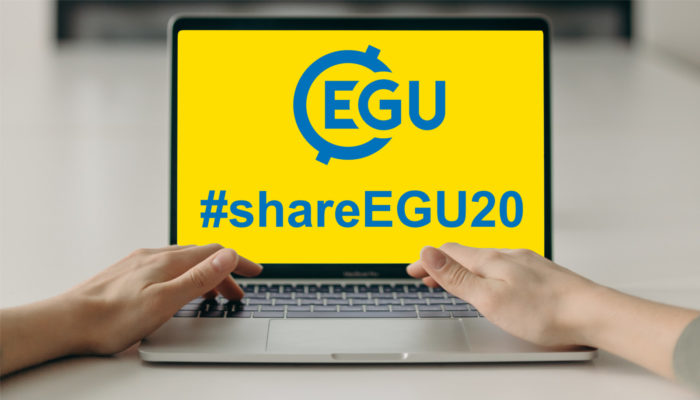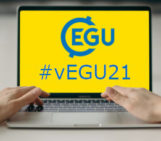
In mid-March it was decided that the EGU conference in Vienna was to be cancelled, with an alternative proposed, the online GA. Being the first EGU general assembly to be held online, many people are doubtful about many aspects, such as how the conference will be organised and conducted. EGU has been providing answers to questions on their page and on Geolog, and we thought we would provide some help and support too. For some ideas on how to make your research into an attractive display on your online session, see the complimentary post here.
Since the announcement of the online GA, I have heard a range of comments, ranging from cautious excitement to anxiousness and rejection. Some authors have already decided that they will not upload anything to the online GA, while others already have materials uploaded.
If you have not yet made up your mind about what you are going to do, then read on. Here, I want to address the most common concerns about the online GA and attempt to predict and thereby prepare for potential issues during the GA.
Common concerns
“How exactly am I going to present my work?”
This question is one of the most common I have heard from colleagues and I will not delve too much into the how here, that is for the companion post. Some of these questions, and others appear on the EGU website FAQ section here, for anyone wanting more info.
I will say here, make sure your work is concise, self-explanatory, and using inclusive colours and language.
“Should I opt-in for commenting/discussion for my work?”
Yes! If you were planning on presenting it at EGU, then you probably wanted to use it to stimulate discussion. If however, your work is already in the late stages of development (i.e. you have already worked out all the bugs), or you have another reason for not wanting comments on your work, then perhaps you could leave the discussion closed and simply chat in the text chat during your session.
One idea to encourage discussion of your work, is to invite people to “visit” your post online, before or during the chats, to get their opinion on your work. As you might have invited people at previous GA’s to stop by your poster, or to come listen to your talk, you can do the same thing here! Consider posting a link to your work on social media, or email those in your community who you would like to discuss your work with.
“How, when, and which text chat should I join?”
The live chat will be hosted on the Copernicus website during the time for your session. It is probably best to be prompt and join at the beginning of the chat, try not to be too nervous to participate. If nobody types anything then there will be no chat! Like the usual EGU, even our brightest minds have been unable to figure out how to be in more than one place at one time so as usual, choose carefully which session chat you would like to be in and try to concentrate on one at a time.
“My session is very early/late in my time zone”
This is an unfortunate consequence of hosting EGU online. If this is the case for you then consider using the opt-in comment option when uploading your materials and during the session ask a co-author or colleague in a more convenient time zone to attend for you to fill you in afterwards.
“I would rather not have my data/results out there for all to see forever on the internet”
I will admit I had this concern at first too, I am quite early on in my recent project and so am protective of it. The default creative commons licence you will be assigned upon upload of work to the online GA will be CC BY 4.0 licence, which means you must be cited if anyone shares the work. If that does not fit with the way you want your work to be presented online, then you can now choose the copyright during the upload process. Regardless of the copyright you choose, if you think someone will use the work you present and steal it, it will be obvious during a plagiarism search and peer review that you had the idea first. For those interested, advice on how to write a copyright statement can be found here.
“I am afraid that having a DOI assigned to my work will limit my possibilities for publication in a scientific journal”
Another issue that might come up with you or one of your advisors, is the fact that a published version of your work already exists when you want to submit your research to a journal. The EGU discusses this issue in their FAQ section, and states that DOI’s to the abstracts will be assigned through EGUsphere, a not-for-profit preprint server. Most journals accept this kind of (not-for-profit) preprint publication prior to submission, as it is designed to facilitate community engagement and scientific discussions. However, if you are still worried, you could consider only presenting part of your work. This could be for example your objectives, methods and some preliminary results. Presenting less material will also help you in the presentation process, as it will be easier to prepare a brief video, or simple self-explanatory poster.
How to best use the online GA
I have attended EGU for three years in a row now, and I think the advice I was offered back then, with how to get the most out of EGU, is still applicable during the online GA. Dive headfirst into the conference, and try to contribute and participate as much as possible!
Many people, myself included, are disappointed that the in-person GA was cancelled and are worried the online version won’t live up to expectations. Much like the physical GA, the online GA will be as successful as its participants are willing to make it.
“Ask not what the online GA can do for you. Ask what you can do for the online GA”
The more people we can get to participate in the session chats and the other events, the better. Many people are nervous to use the online tools and chats, and some will be too busy to participate, so to those of us who can, I will see you there.
Let’s have another great EGU and show how adaptable the scientific community is as a whole!



